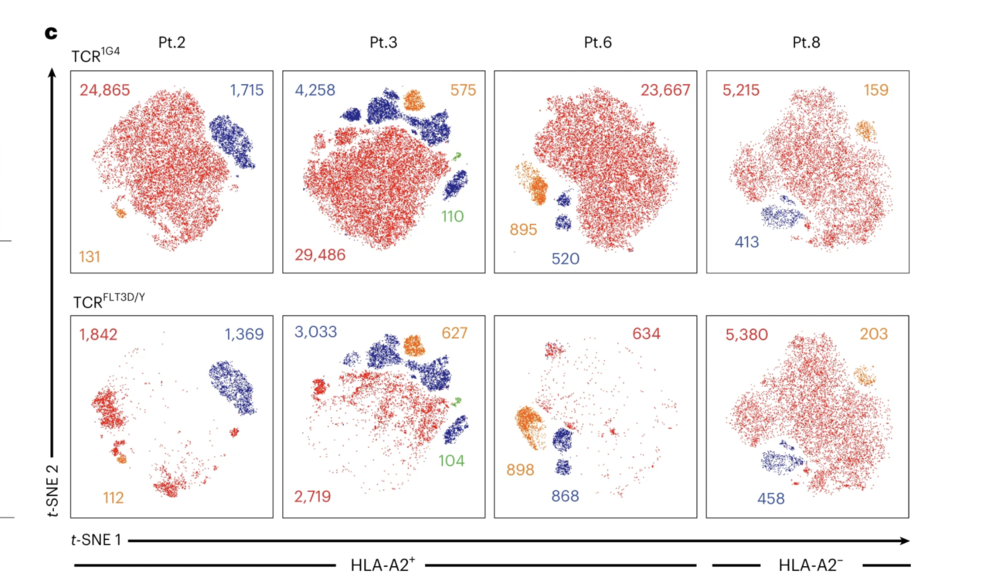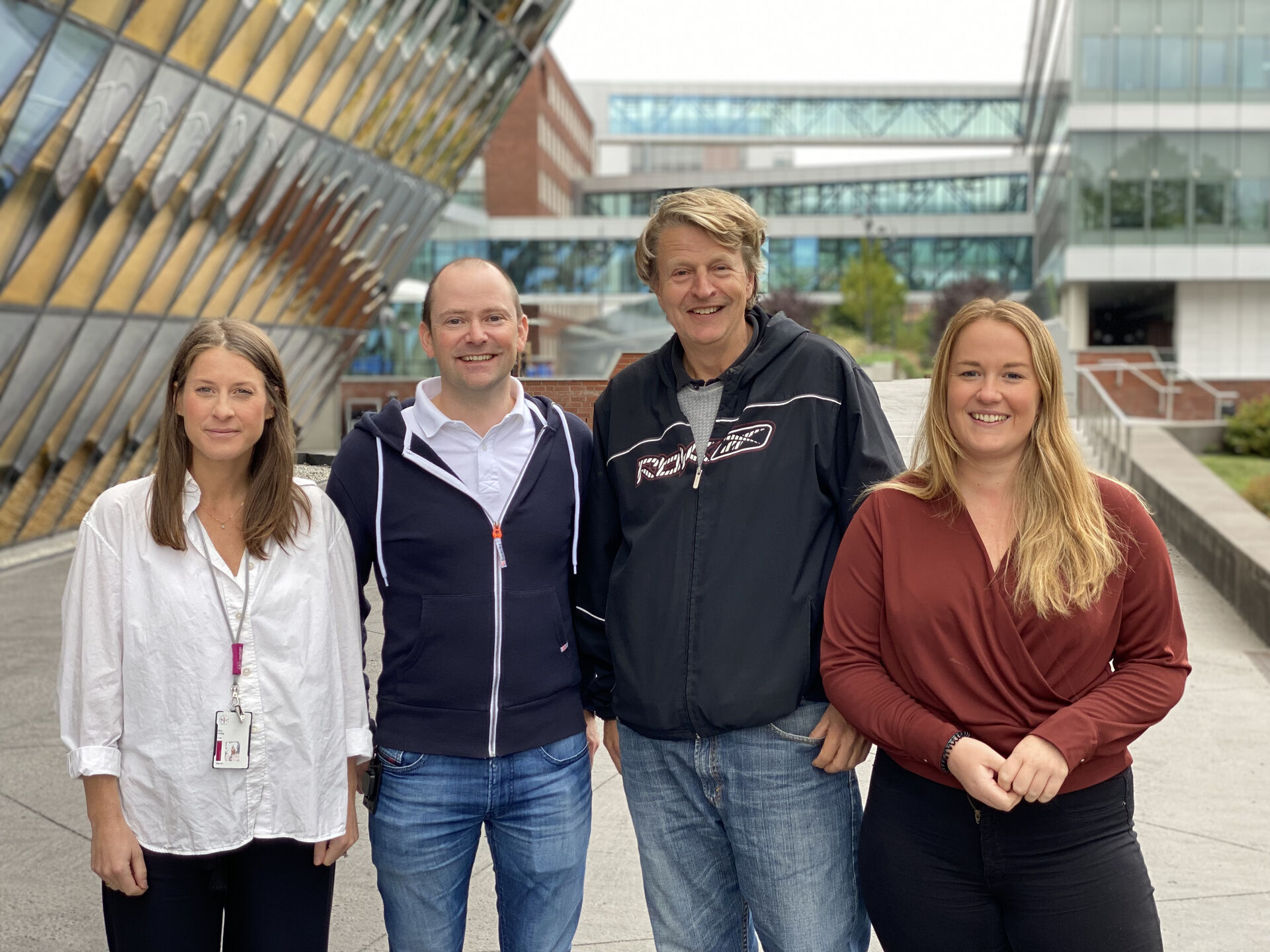Researchers have identified a novel immunotherapy for acute myeloid leukemia (AML). Immune cells are programmed to recognize a mutation found in leukemia patients. The results provide hope for new and effective treatment for the most common form of leukemia in adults.

Visualization of blood cells from four leukemia patients from left to right, after treatment with TCR T cell therapy targeting the mutation (lower row) or control T cells (upper row). The leukemia cells in red are killed after a few hours, while various normal blood cells in orange, blue and green remain unaffected by the treatment. The blood from Patient 8 on the right is a control that lacks a target for the TCR T cells, and the leukemia cells are therefore not eliminated. Illustration by the researchers.
Our blood cells are formed and matured in the bone marrow. However, sometimes mutations or damage occur in the cells' genetic material. This can lead to uncontrolled growth of blood cells and improper maturation.
Acute myeloid leukemia (AML) is a type of acute blood cancer where the bone marrow gets overcrowded with such immature blood cells.
Acute myeloid leukemia is a disease with a very poor prognosis
AML is the most common form of leukemia in adults. It is a very rapidly developing disease.
"AML is a disease with a very poor prognosis. With standard treatment, one-third of patients have a 5-year survival rate after diagnosis," says Professor Johanna Olweus.

She is a professor at the University of Oslo and Head of Department of Cancer Immunology at the Cancer Clinic at Oslo University Hospital, and a world-leading researcher in immunotherapy.
"Immunotherapy has led to significant advances in the treatment of several types of cancer. However, there is currently no approved immunotherapy for AML", Olweus says.
"The exception is stem cell transplantation, which is a treatment with potentially life-threatening side effects. Many patients cannot tolerate this treatment and therefore cannot receive it. You also cannot find stem cell donors for all patients," she explains.
Could mutations be a possible target for treatment?
For immunotherapy to be effective, the immune cells need good therapeutic targets to attack. However, the targets should not be found on healthy cells, as they would also be attacked.
Olweus and colleagues have now found that certain mutations in cancer cells can be attractive targets in AML.
"This provides hope that we can develop a new and effective treatment for acute myeloid leukemia. The results are likely of relevance also for other types of cancer," says Olweus.
Olweus is PI of the work carried out by her research group at UiO and OUS, in collaboration with the groups of researcher Petter Woll and Professor Sten Eirik Jacobsen at Karolinska Institutet. Postdoctoral fellow Eirini Giannakopoulou in Olweus' group is first author on the article describing the results. PhD fellow Madeleine Lehander supervised by Woll and Jacobsen at Karolinska Institutet has had a central role as second author.
The study is published in the prestigious journal Nature Cancer.
Mutations exist only in cancer cells
All cancers are caused by mutations in the DNA. Thus, researchers are focused on mutations in the search for new treatment options for cancer.
"Research in recent years has given us great hope that it will be possible to target immunotherapy to selected mutations. This is because mutations are specific for cancer cells and are a necessary part of cancer development," explains Olweus.
Mutations are unique to the individual cancer tumor and patient
However, it is not so simple. So far, the results have been discouraging.
"Almost all mutations are unique to the individual cancer tumor and patient. Targeted treatment must therefore be tailored to each individual patient," explains the professor.
"We also know that many mutations exists only in some cancer cells, which allows the other cancer cells to escape treatment. In addition, there are very few mutations that have the ability to stimulate immune responses," she adds.
The researchers have identified a T-cell receptor that recognizes a shared mutation in AML
The goal of immunotherapy is to help the immune system protect the body against cancer development and to fight cancer. T-cells are part of this immune system. T-cell receptors are proteins that are found on the surface of T-cells.
They play a crucial role in recognizing, activating, and stimulating our immune system to respond to threats, like viral infections.
This is where the researchers have made a breakthrough. Specifically, they have been able to identify a T-cell receptor that can recognize a specific mutation that is typical for acute myeloid leukemia, and shared between a subgroup of patients with AML.
"A gene that is often mutated in this disease is called FLT3. Mutations in this gene can contribute to the rapid development of the disease. Using technology that my group has developed, we have been able to identify a T-cell receptor that recognizes one mutation in FLT3," Olweus explains.
"Like finding a needle in a haystack"
The researchers noticed that there are some mutations that are found in several AML patients. These mutations, shared among several patients, could be attractive therapeutic targets.
"The discovery is a bit like 'finding a needle in a haystack,'" says postdoctoral fellow Eirini Giannakopoulou.
The researchers equipped T-cells with the T-cell receptor through gene transfer. In this way, the T cells were programmed to attack cancer cells with this particular mutation.
They were further able to show that the T-cell receptor is safe and that it does not react with normal cells, only with the mutation from the cancer cells.
.jpg)
Eliminated mutated cancer cells within two weeks in mice
But how could the researchers test whether this T-cell receptor can be used in the treatment of leukemia?
In collaboration with the groups of Woll and Jacobsen at Karolinska institutet, the researchers created a model for the disease, a tailored mouse model that mimicked AML. Leukemic cells from patients were transplanted into mice. Then they tested whether T cells equipped with the T-cell receptor were able to attack the cancer cells.
These results were very clear. In just two weeks, the treatment effectively eliminated mutated leukemic cells in the mice.
Proof-of-concept study
The study is a "proof-of-concept" study, where researchers test whether an idea can work in reality. This is important in order to proceed to clinical trials.
The aim in this study was to see whether genetically modified T cells, programmed to recognize mutations, could be an attractive treatment option for AML.
"An important finding was that we could show that the programmed T-cells could also kill cells that have characteristics of stem cells in leukemia," says phD fellow Madeleine Lehander from Karolinska Institutet.
Leukemia stem cells cause relapse of AML.
Highly important and complementary collaboration over many years
The study is a close collaboration between the research groups of Olweus at UiO and OUS, and the research groups of Woll and Jacobsen at Karolinska Institutet.
"Woll and Jabobsen's groups are world leading researchers in the development of normal and malignant blood cells and AML models, which we use in our research. The expertise in these research groups has been crucial to the project", says Olweus.
"This has been a fantastic collaboration that has lasted for many years, where the groups complement each other's expertise perfectly," she adds.

Reference
Giannakopoulou, E., Lehander, M. Culleton, S. V. et al. (2023). A T-cell receptor targeting a recurrent driver mutation in FLT3 mediates elimination of primary human acute myeloid leukemia in vivo. Nature Cancer. https://www.nature.com/articles/s43018-023-00642-8






